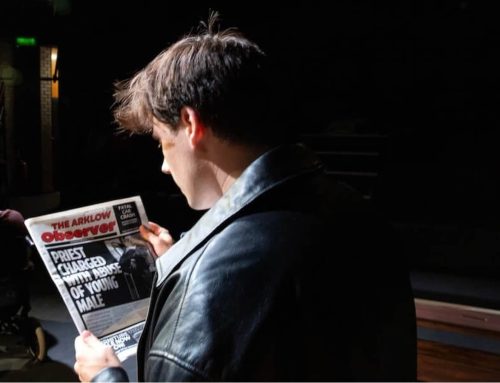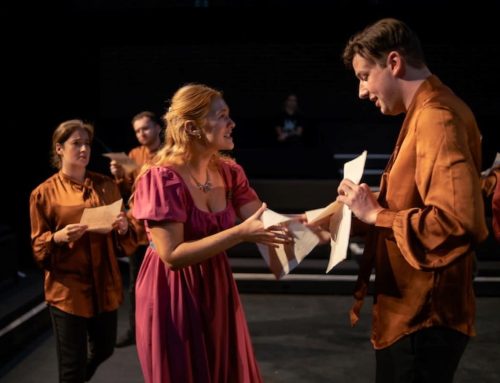Knife on the Table, Jonathan Brown’s sober ensemble piece about power struggles, knife violence, and relationships in and around a gang of small-time British drug dealers, covers familiar territory. Think TV’s Top Boys, or perhaps The Wire, condensed into 90 minutes. There is enough urban grit here to hold the attention for the duration, but the characters are familiar and struggle to emerge as more than simplistic ciphers for poverty and inner-city decay.
Studious sixteen year-old Book (Moyosola Olashore gets the best of the evening) wants to be a surgeon, but her school maths scores are down, and she needs to find the money for a private tutor. Book’s former school crush Flint (Jez Davess-Humphrey in full-on pimp roll and Multicultural London English mode) is now a small-time street drug-dealer with a yearning for his erstwhile love. “Have you been cover-to-cover with Book?” a character asks Flint. Not yet, but it is most definitely on the lad’s agenda. “This ain’t Romeo and Juliet” Book tells him, so there is work to be done. Will Book get dragged into Flint’s seedy ambit? Readily available cocaine is mighty handy for pre-exam, study all-nighters.
Drug boss Angel (Jonathan Brown performs as well as writes and boasts a tremendous full-face tattoo) has his eye on Flint and wants the lad to move up in the ranks. Said promotion requires a nervous Flint to take out former school bestie, now fellow dealer Bragg (Rowan Armitt-Brewster evinces malevolence). “If you want to stay in the firm, snuff someone” Angel says by way of laying the deal out.
The complication? Bragg is a psychopathic murderer and rapist who pimps out his pregnant fourteen year-old girlfriend Shania (Helen Ajayi) for cash. “You’re his girl?” someone asks Shania of Bragg. “I’m his dog” is the considered response. Offing Bragg will take some big cojones and an even bigger knife. “I’ve got a rep, a little fame on my name” Bragg brags of his ability at knife crime. Handily, Angel has a large collection of Moroccan blades he is willing to lend Flint.
Add into the complex mix Flint’s hard-working mum Chantal (a tremendously likeable Magdalene Mills). “Are you ever going to be more than a statistic” mum asks of Flint by way of foreshadowing. Then there is the lad’s estranged, reformed-dealer and former con dad Danny (Nicholas Clarke). Dad’s determination to “steer Flint right” drives his waking hours and drives his new girlfriend Carol (Emma Bakare) to distraction. Carol, by way of narrative serendipity, is pregnant Shania’s youth worker.
Absent a clearly defined central protagonist Brown’s early narrative emerges through an ambitious series of rapid-fire crosscuts between multiple storylines, many of which take place in phone calls. At its best there is something of Caryl Churchill about the writing style. Conversations interweave in bursts of sharp, clipped dialogue. Done effectively the technique builds tension and creates a real sense of urgency. But it does rely on a well-rehearsed ensemble cast, economy of language, and tightly focussed direction to pull it off. Here Brown’s approach is uneven and sometimes confuses as much as elucidates.
Dialogues occasionally collide. Flint says “Yeah, yeah, yeah” and “laters” a lot, a contrivance which detracts from the rhythmic, rapid-fire brevity of dialogue one supposes the writer is aiming for. Later, longer scenes emerge more convincing in effect, and certainly feel easier for the cast to get their teeth into. Attempts at sketching out a back story for gang boss Angel (who used to be called Ralph and had a traumatic childhood) and Danny add little here.
Live musician Fred Hills sits on an industrial scaffold at the rear of the stage, underlining key dialogue points with percussive drumbeats. It is a neat addition to the piece which adds both momentum and a sense of underlying threat. Stage designer Lillian Caccia etches multiple silver lines on the floor. Seen from above these map out the streets and alleyways that form the dealers’ territory. Boxes, useful for sitting on, seem to represent the tower blocks where the crew reside.
Brown draws the various narrative strands together neatly enough by the close, although opinions will vary on whether the epilogue feels right. Ultimately you may not feel strongly enough about these stock poverty-porn characters to worry about what happens to them.
Writer: Jonathan Brown
Directors: Jonathan Brown & Marlie Haco
More Recent Reviews
Playfight. Soho Theatre.
Writer Julia Grogan’s breathtakingly assured debut play arrives at Soho Theatre following stellar reviews at the Edinburgh Fringe and [...]
All The Happy Things. Soho Theatre.
Naomi Denny’s three-hander comedy-drama All The Happy Things covers familiar themes within a recognisable premise. A grieving protagonist comes [...]
Telly. Bread and Roses Theatre.
The challenge with absurdist comedy is that many people do not find it funny. Laughing at the sheer weirdness [...]






